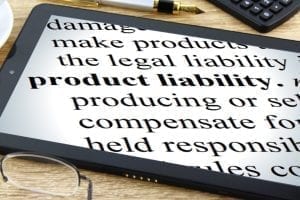Go through policy exclusions to find out what isn’t covered, and any requirements or stipulations – such as a specified level of quality control – that are needed for the policy.
Any business that manufactures or sells goods needs product liability insurance. It generally secures you against legal claims for injury or damage caused by your products and defending claims so you could continue your business without worry.
Since most small businesses face difficulties in managing unexpected costs, having product liability is essential for protecting your business against costly legal claims. The hefty compensation cost when your company is found liable, combined with the loss of income, might be fatal for small businesses without product liability cover.
Generally speaking, there are three liability insurance policies that small businesses need to consider: public liability insurance, product liability insurance, and employers’ liability insurance. For public liability, it provides cover against any third party injury or perhaps damage claims caused by your specific business activities. An employer’s liability insurance can also cover employee injury claims.
Although employer’s liability insurance is always a legal requirement if your company hires staff, public and product liability are voluntary and aren’t required by law. Usually, both are sold together as a package.
Product Liability Insurance
Typically, this insurance covers the legal action cost and compensation when someone is injured, or their particular property is damaged by a product that your company has sold or made. The product can generally be any type of products sold to other companies or the public, such as machinery, equipment, medicines, household items, clothing, food, vehicles, and software. The person doesn’t need to be the user or buyer to make a claim, provided they suffered injuries or their property damaged.
Specialist business insurers usually sell product liability insurance as a policy. It is an essential purchase since, without it, your company could be sued when found liable for injury or damage. Product liability insurance crucially covers the compensation cost up to a certain amount, including the legal fees incurred defending against any claim.
Reasons to Consider Product Liability Insurance for your Business
Retailers, distributors, suppliers, and manufacturers are usually held liable for injuries caused by their specific products or their products’ parts; however, the level of liability is determined on a case-by-case basis. Although product manufacturers usually have the largest liability, each business along the supply chain has a duty of care to their clients. Therefore, if your business supplies or makes products, it’s prudent to get product liability insurance.

However, this insurance isn’t a legal requirement. As a business you don’t have to hold a policy; however, retailers, distributors, supplies, or manufacturers that your company works with might need you to have it as part of your particular contract. Generally, you’ll require product liability insurance if you sell or make products part-time or as your hobby; for example, making and selling jewelry or cupcake baking.
The amount of time for a person to make a claim against your company is also lengthy. A compensation case may be made anytime within three years of the product’s application. In some situations, it might be up to ten years after that product was sold. That means you need product liability insurance to protect gaps in the manufacture or even when you stop trading.
How Much Product Liability Insurance Do You Need?
The degree of product liability insurance your company requires depends on the type and size of your business, and the kind of products you sell. Since there are no set rules/regulations for the amount of cover you should have, it’s entirely your choice – but it’s crucial not to skimp on purchasing product liability insurance then end up underinsured.
Since each claim is usually treated as a case-by-case basis, there is no legal limit on the cost to your company when it’s sued. Costs are measured on the severity of the case and the loss scale. In case a faulty product has a relatively large distribution and harms a lot of people, compensation costs might run into the millions. Additionally, there might be other costs involved, including the need for a product recall and professional evaluations of the fault. Regardless if it’s only an individual claim, a client suffering loss of earning for many months may mean a claim of thousands of dollars.
When Choosing a Suitable Level of Cover, Consider These Three Factors:
– Potential scenarios. Evaluate the ways your product might injure someone or damage their property. In case that occurred, such as faulty safety equipment or food poisoning, evaluate the possible level of damage.
– Any contractual obligations. Think of any contractual obligations with any suppliers. Ensure to check the contracts since most set a minimum level of cover. It would help to seek legal advice before signing contracts with manufacturers and distributors of the products you sell. Check for “hold harmless” clauses or indemnity that releases a third-party from liability for goods produced or sold. Such clauses may affect the price you incur for product liability insurance, and you must seek to have them removed from that contract.
– Potential payouts. When someone makes a successful claim against your company, calculate the possible payout. In case your product is unlikely to lead to much damage or harm, then you might consider a lower-level of cover.
It’s prudent to consult on the level of cover you require from industry or governing bodies.
How Do You Buy Product Liability Insurance?
In general, you could get product liability insurance from your insurer or from a specialist broker. Product liability isn’t usually sold as a separate policy. It’s often added in other business insurance packages including a public liability insurance policy.
Also, when buying a policy, check out whether it covers all issues such as safety claims, manufacturing quality, and medical claims. Go through policy exclusions to find out what isn’t covered, and any requirements or stipulations – such as a specified level of quality control – that are needed for the policy. When you take extra measures such as enhancing the quality control process, you could often negotiate relatively lower premiums. In case you are still uncertain, consult a solicitor specializing in contracts.


Join the conversation!